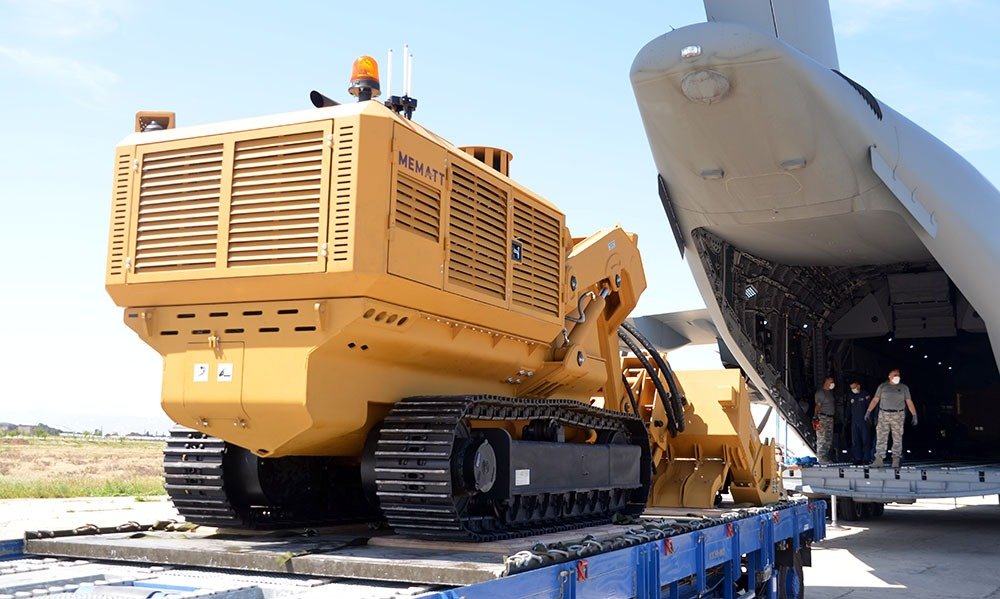This week, Azerbaijan received five new Turkish-made minesweepers to accelerate the mine clearance operations in the liberated Karabakh region.
“The export of MEMATT [Mechanical Mine-Clearing Equipment], a remote-controlled mine-clearing vehicle produced by ASFAT, which is an affiliate of our ministry, continues to Azerbaijan,” Turkey’s National Defense Ministry wrote on its Twitter page on Wednesday.
The mine specialists of Azerbaijan now have seven MEMATTs at their disposal. Two units of the same brand have been brought and successfully tested in the country in February. Azerbaijani officials confirmed that the newly acquired minesweepers would join large-scale demining operations in the territories liberated from the Armenian occupation last year. A total of 20 MEMATTs are expected to be imported to Azerbaijan based on the agreement signed with the Turkish defense ministry.
MEMATT is a top-notch unmanned mine-clearing equipment co-produced by Turkey’s state-run defense contractor ASFAT and the Turkish private defense companies.
The machine is covered with Armox 500T, known as the world’s toughest protection plate made of ultra-hard armor steel. MEMATT is mine-resistant and controlled remotely from up to 500 meters (1,640 feet). The maximum speed of the equipment is 4 kilometers (2.48 miles) per hour, and it can dive into a depth of 25 centimeters from the surface and clear a 1-kilometer-long, 1.7-meter-wide area from mines within an hour.
Azerbaijan’s lands have been mined heavily during their nearly 30-year-long occupation by Armenia since the early 1990s. Armenia kicked off full-blown military aggression against Azerbaijan following the Soviet Union’s dissolution in 1991. The bloody war until a ceasefire in 1994 saw Armenia occupying 20 percent of Azerbaijan’s internationally recognized territories – the Nagorno-Karabakh (Daghlig Garabagh) region and seven surrounding districts. Over 30,000 Azerbaijanis were killed, and one million were expelled from those lands in a brutal ethnic cleansing policy conducted by Armenia.
As part of 44-day-long counter-attack operations that took place last year, Azerbaijani forces managed to liberate over 300 occupied settlements, including the cities of Jabrayil, Fuzuli, Zangilan, Gubadli, and Shusha. The war ended in a tripartite ceasefire statement signed by Armenia, Azerbaijan, and Russia on November 10. Armenia also returned the occupied Aghdam, Kalbajar, and Lachin districts to Azerbaijan as part of the agreement.
Shortly after the war, Azerbaijani authorities rolled out full-scale mine clearance operations in the Karabakh region.
In addition to Turkish MEMATT, ANAMA deploys three Slovak-made Bozena-4 and two Bozena-5 minesweepers, one Croatian-made MV-4 special-purpose mine-clearing machine, and one AARDVARK mine clearance vehicle of the British production.
The mine clearance activities in the liberated territories face major difficulties due to Armenia’s refusal to submit the maps of areas contaminated by mines. Azerbaijani authorities have repeatedly called on the Armenian side to provide these maps to prevent humanitarian and environmental disasters. The Armenian officials, however, still did not respond to the calls.
Officials at the Azerbaijan National Agency for Mine Action (ANAMA) say the neutralization of unexploded ammunition, warheads, and missiles in the combat zones could take 5-6 years, while it is about 10-13 years for the mined areas.
According to data compiled by Azerbaijan’s Foreign Ministry, as of April 4, twenty citizens of the country, including 14 civilians, have been killed and 85, including 16 civilians, wounded by mines in the liberated territories.
"When we come across a mine line 30 meters wide, we can find at least 100-150 mines there," Madad Mammadov, an operations manager at ANAMA, said.







 The number of evacuees from flooded areas in Kazakhstan has reached 97,852 people, including about 32,856 children since March 27.
The number of evacuees from flooded areas in Kazakhstan has reached 97,852 people, including about 32,856 children since March 27.
 The Islamic holy month of fasting, Ramadan comes to an end this week with the celebration of a joyous festival called Eid (meaning “festival” in Ar...
The Islamic holy month of fasting, Ramadan comes to an end this week with the celebration of a joyous festival called Eid (meaning “festival” in Ar...
 Iran's senior military leaders described the drone and missile attack on Israel on April 14 night as “successful".
Iran's senior military leaders described the drone and missile attack on Israel on April 14 night as “successful".
 Iranian President Ebrahim Raisi warned Israel that it would face a "real and extensive" response if it makes any "mistake" following Tehran’s missi...
Iranian President Ebrahim Raisi warned Israel that it would face a "real and extensive" response if it makes any "mistake" following Tehran’s missi...



